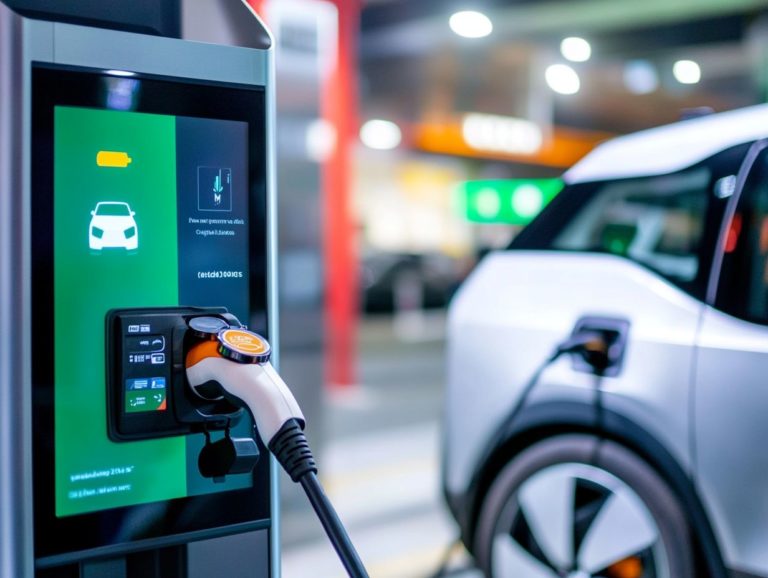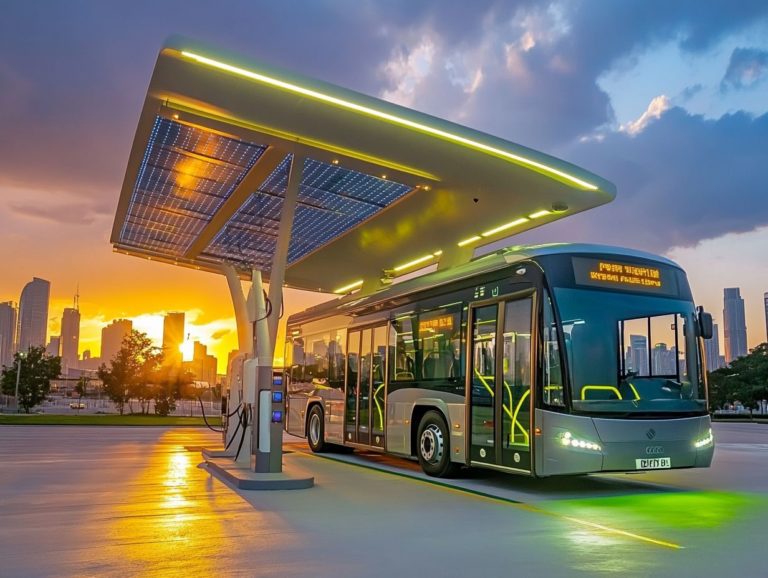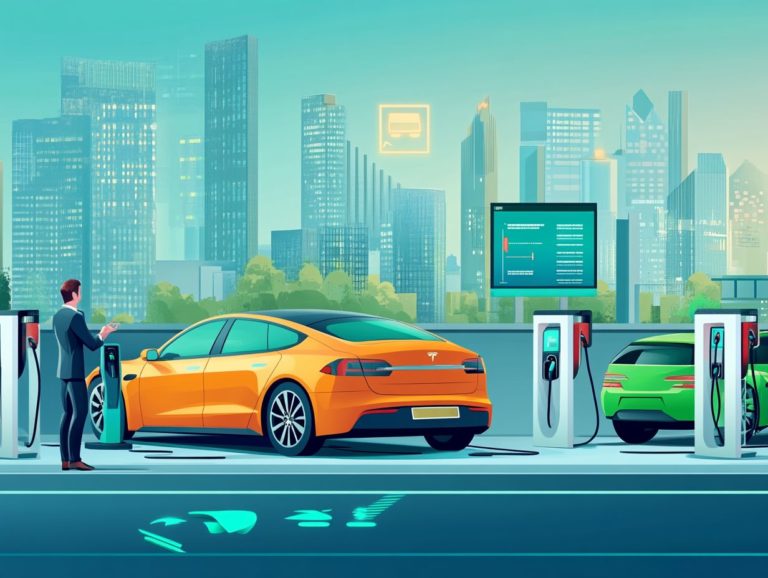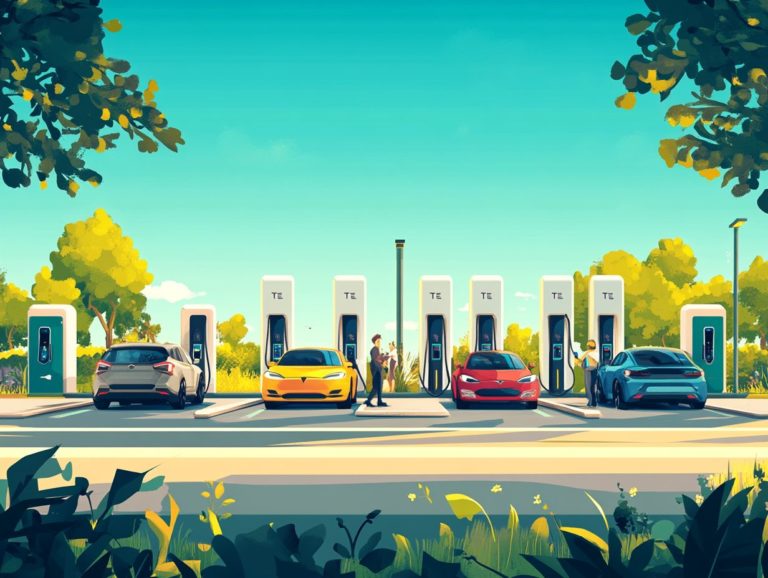understanding the cost of home ev charging
As electric vehicles (EVs) gain momentum, you may find yourself contemplating the advantages of home EV charging.
But what does it truly cost? This article delves into the many factors that impact the price of charging your EV at home, from electricity rates to your specific usage patterns.
You ll also uncover strategies to reduce your charging expenses and see how the overall costs of home charging stack up against traditional gasoline. Explore the financial and environmental benefits that accompany this smart transition!
Contents
- Key Takeaways:
- The Cost of Home EV Charging
- Calculating the Cost of Home EV Charging
- Ways to Reduce the Cost of Home EV Charging
- Comparing the Cost of Home EV Charging to Gasoline
- Frequently Asked Questions
- What is meant by ‘home EV charging’?
- What factors affect the cost of home EV charging?
- Is it cheaper to charge an EV at home compared to using public charging stations?
- How can I estimate the cost of home EV charging?
- Are there any additional costs associated with home EV charging?
- Is there a way to reduce the cost of home EV charging?
Key Takeaways:
- Understand the costs of home EV charging by considering electricity rates and usage.
- Reduce charging costs with efficient strategies and available incentives.
- Compare home EV charging costs to gasoline for potential savings and environmental benefits.
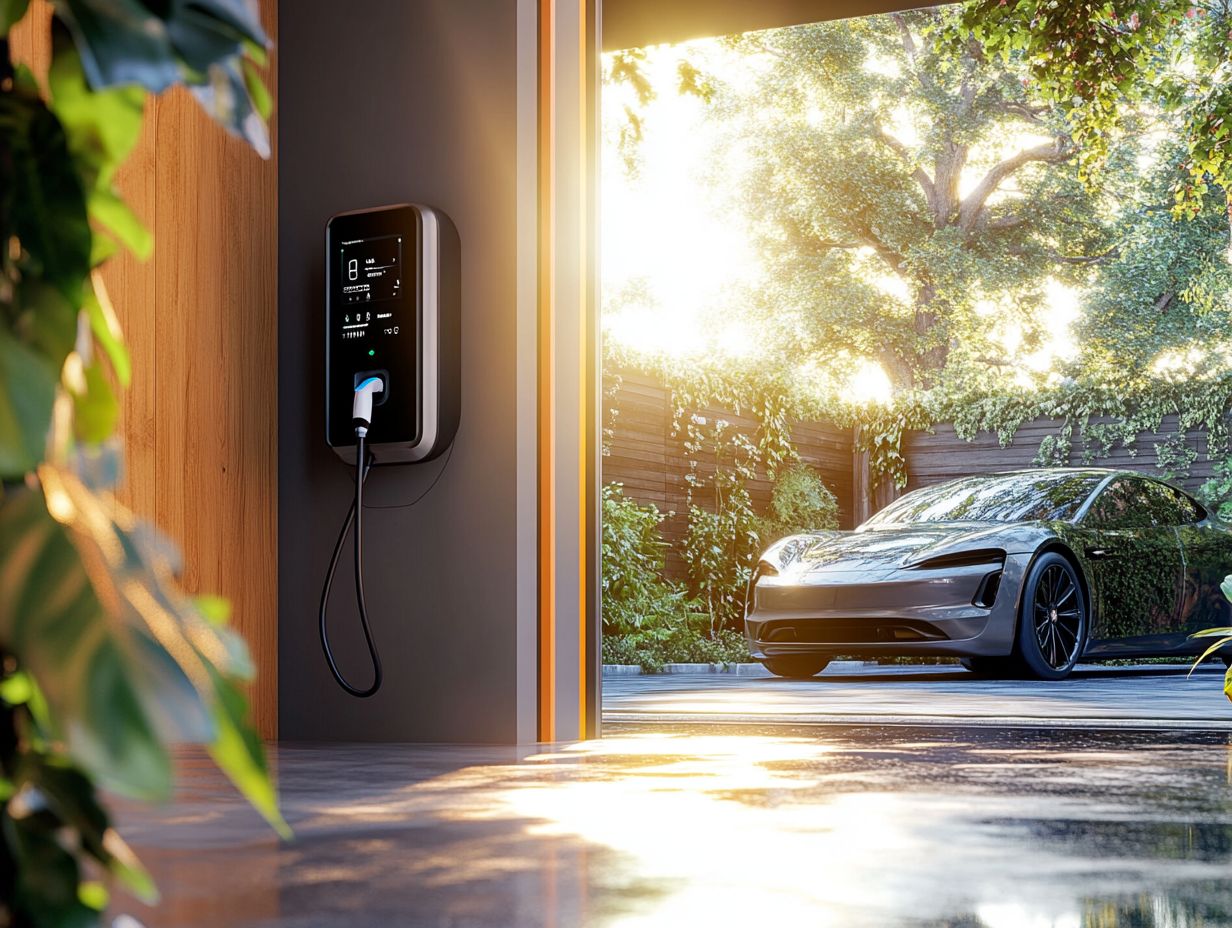
What is Home EV Charging?
Home EV charging involves recharging electric vehicles like the Tesla Model 3 and Nissan Leaf right in your garage. By installing a Level 2 charger, which is faster and requires installation, you ll significantly boost your charging speed compared to a Level 1 charger that uses a standard outlet.
The beauty of home charging is that you can power up your vehicle overnight, seamlessly fitting it into your daily routine. It s essential to grasp the charging process and the equipment needed for a hassle-free experience.
Every type of electric vehicle, from hybrids to plug-in models, benefits from this setup. Charging speed is a game-changer; for example, with a Level 2 charger, you can gain about 25 miles of range for every hour of charging. That s a far more efficient option than traditional methods.
When installing a home charging station, consider your electrical infrastructure, including your home s voltage capacity and whether you need a dedicated circuit.
Choosing home charging saves you time and spares you the headache of searching for public chargers, especially during long road trips. Homeowners often find their electricity costs lower than public charging fees, making this a smart financial decision.
The Cost of Home EV Charging
The cost of home EV charging fluctuates due to various factors, including installation expenses, electricity rates, and the type of charging equipment you choose, particularly Level 2 chargers. As a homeowner, you may also need to factor in potential costs for upgrading your electrical panel or setting up a dedicated circuit to support the charger.
Programs like Qmerit can be invaluable in assisting with both installation and figuring out the details of charging permits in San Jose, California, while ensuring compliance with the National Electrical Code.
Factors that Affect Cost
Several factors influence the overall cost of home EV charging, including installation expenses, the energy efficiency of your charging equipment, and your local electricity rates. The capacity of your electrical panel may dictate whether upgrades are necessary, and effective load calculations will help determine the electrical capacity required for a safe installation.
Understanding these elements gives you the power to make informed decisions and navigate the permitting requirements in your jurisdiction.
When considering charging equipment, focusing on efficiency is crucial. Some chargers provide faster charging times while consuming less energy, ultimately leading to lower long-term costs. Assess your charging habits in relation to your energy provider s rates, as time-of-use tariffs can significantly affect your expenses.
Effective load calculations will ensure your residential charging setup can accommodate future needs, offering flexibility for additional electric vehicles or increased energy demands. By prioritizing energy-efficient solutions and adhering to proper load management practices, you can enjoy substantial savings while minimizing your environmental footprint.
Calculating the Cost of Home EV Charging
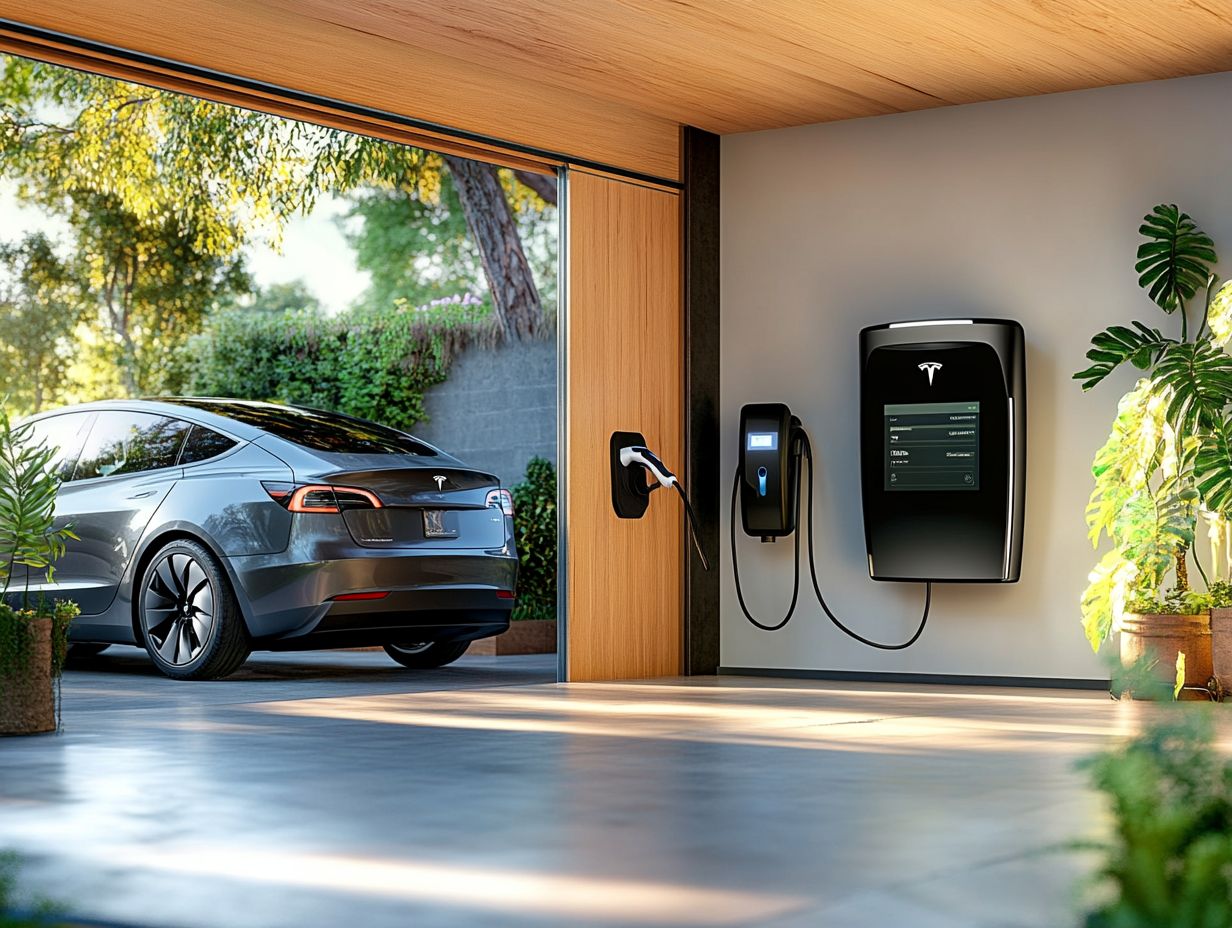
Calculating the cost of home EV charging requires a keen understanding of electricity rates and their relationship to the kilowatt-hours consumed during the charging process, as well as understanding the costs of EV maintenance.
To determine your total charging costs accurately, consider your vehicle’s battery size and the average charging time needed for a full charge. You should also factor in the energy consumption specific to your electric vehicle.
Understanding Electricity Rates and Usage
Understanding electricity rates and usage is essential for homeowners who want to optimize their electric vehicle (EV) charging costs. Rates can vary based on pricing that changes based on the time of day, and knowing how many kilowatt-hours your charging process consumes can lead to significant savings.
Considering energy storage solutions can enhance your efficiency and help reduce overall electricity expenses. During peak hours, typically in the early evenings when demand surges, electricity rates can soar, making it costly to charge your EV.
On the flip side, off-peak hours often late at night offer substantially lower rates. Charging your vehicle during these times allows you to save significantly. By installing energy storage systems, such as home batteries, you can store energy during off-peak hours and use it later when rates may be higher.
This strategic approach minimizes your electricity bills and maximizes your use of renewable energy sources like solar. With these tactics, you’ll significantly enhance your EV charging efficiency and enjoy considerable cost savings.
Calculating the Cost Per Charge
Calculating the cost per charge for your electric vehicle involves a bit of math, but it s straightforward once you grasp the electricity rates in your area and your vehicle’s battery size, typically measured in kilowatt-hours. Kilowatt-hours measure how much energy your electric vehicle uses.
By multiplying the kilowatt-hours needed to charge your vehicle by the cost per kilowatt-hour, you can easily figure out your charging expenses. For example, consider popular models like the Tesla Model 3, which has a battery capacity of about 54 kWh, or the Nissan Leaf, with a capacity of around 40 kWh.
First, check your local electricity rate let s say it s 15 cents per kWh.
- For the Tesla Model 3, charging from empty would set you back about $8.10 (54 kWh x $0.15).
- For the Nissan Leaf, the total would be roughly $6 (40 kWh x $0.15).
Keep in mind that charging speed ranging from standard to fast chargers can influence these costs. While faster chargers may come with higher rates, they save you time, making them a valuable option for quick trips.
Understanding these dynamics gives you the power to plan your budget more effectively as an EV owner.
Ways to Reduce the Cost of Home EV Charging
You can dramatically cut down your home EV charging costs by implementing efficient charging strategies and capitalizing on available incentives and rebates.
By exploring various charging solutions, you ll achieve long-term savings on electricity costs and enhance your overall energy efficiency, ultimately leading to lower expenses.
Efficient Charging Strategies
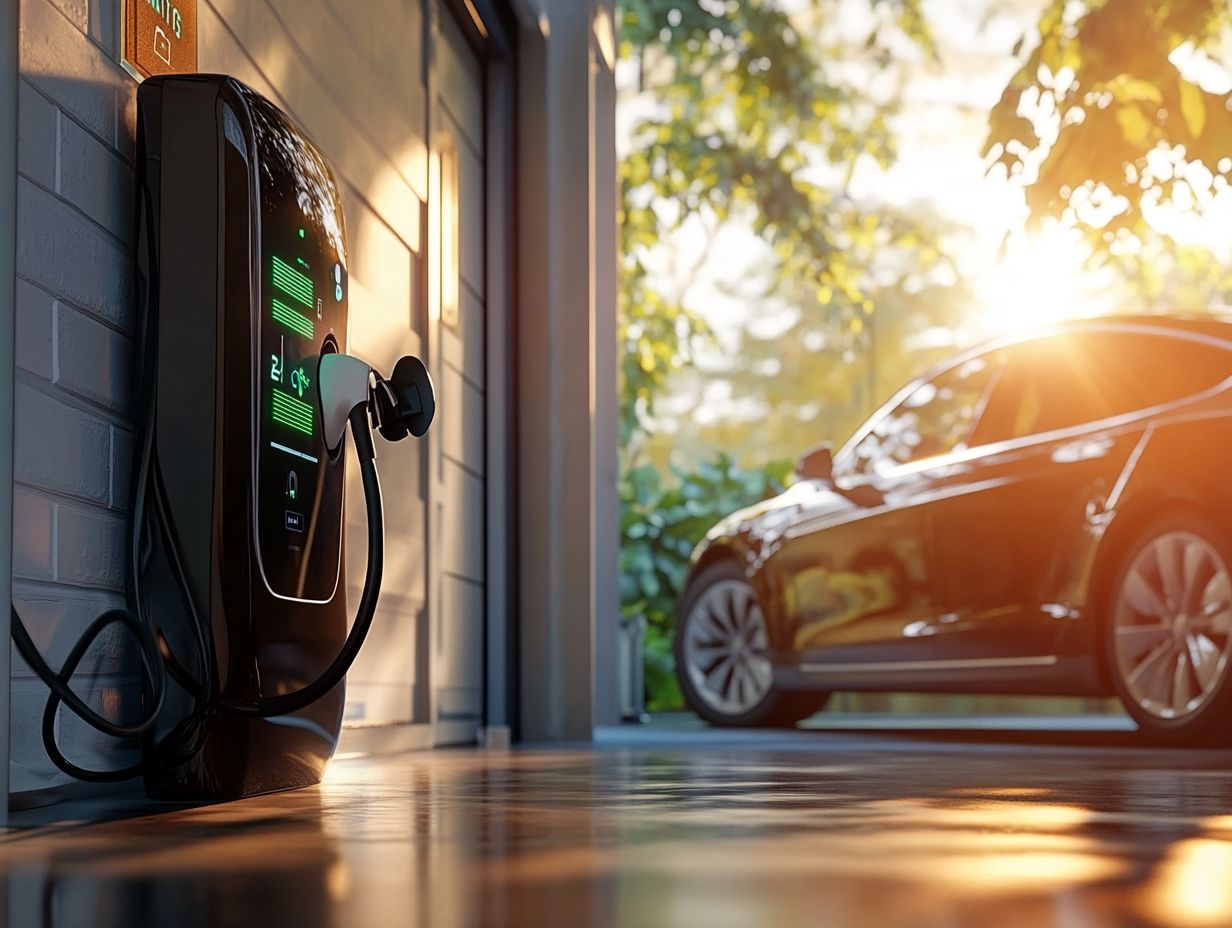
Implementing efficient charging strategies can drastically reduce the costs associated with home EV charging. By timing your charging sessions during off-peak electricity rates and optimizing the charging duration, you can lower your energy expenses while enjoying a smooth and hassle-free charging experience.
Many electric utilities offer pricing that changes based on the time of day, allowing you to benefit from lower rates during specific hours. A compelling case study from California revealed that households leveraging these pricing structures experienced savings of up to 30% on their monthly energy bills.
You can also use smart chargers with scheduling capabilities to automate your charging sessions. This ensures your vehicle is charged only when electricity costs are at their lowest.
Additionally, adopting home energy management systems can provide you with real-time insights, giving you the power to monitor and control your energy consumption effectively.
By embracing these strategies, you enhance your cost-effectiveness and play a vital role in fostering a sustainable energy future!
Incentives and Rebates
Numerous local and state programs present enticing incentives and rebates for homeowners like you who are investing in home EV charging solutions. Think tax credits for installing charging equipment; it’s a savvy way to offset your costs.
Companies like Qmerit can be invaluable allies in navigating these opportunities, helping to reduce those initial expenses and enhance accessibility for EV owners. In San Jose, California, for instance, initiatives like the California Electric Vehicle Infrastructure Project (CALeVIP) are designed to make your transition to electric vehicles less intimidating by offering direct rebates for EV chargers.
Local utility companies often provide discounts or rebates on installation fees, making the financial leap to electric even easier. Seize these incentives to transform your garage into a convenient charging station without the looming fear of exorbitant initial investments.
This not only benefits you but also fosters a wider adoption of sustainable transportation options within your community.
Comparing the Cost of Home EV Charging to Gasoline
When you compare the cost of charging your electric vehicle at home to filling up with gasoline, the potential savings are quite evident.
With gasoline prices constantly in flux and your home s electricity rates remaining stable, you stand to enjoy significantly lower fueling costs.
Plus, you ll embrace the environmental benefits that come with driving an electric vehicle, making it a win-win situation for both your wallet and the planet.
Cost Savings and Environmental Benefits
The cost savings of charging your electric vehicle at home are remarkable, especially compared to traditional gasoline fueling. Not only do you lighten your wallet’s load, but you also make a positive contribution to the environment.
By choosing electric vehicles, you re not just slashing your fuel costs; you re also shrinking your carbon footprint and championing energy efficiency.
Recent studies reveal that the average electric vehicle can save you over $800 each year in fuel expenses while cutting greenhouse gas emissions by nearly 40%. This stands in stark contrast to gas-powered cars, which, regardless of fluctuating fuel prices, tend to create a cycle of continuous spending spikes.
Consider the Tesla Model 3 or the Nissan Leaf. These electric vehicles shine with impressive energy efficiency ratings, averaging around 130 MPGe.
This amazing efficiency boosts your budget while playing a pivotal role in fostering a transition to cleaner energy, making a meaningful impact on the environment for generations to come.
Frequently Asked Questions
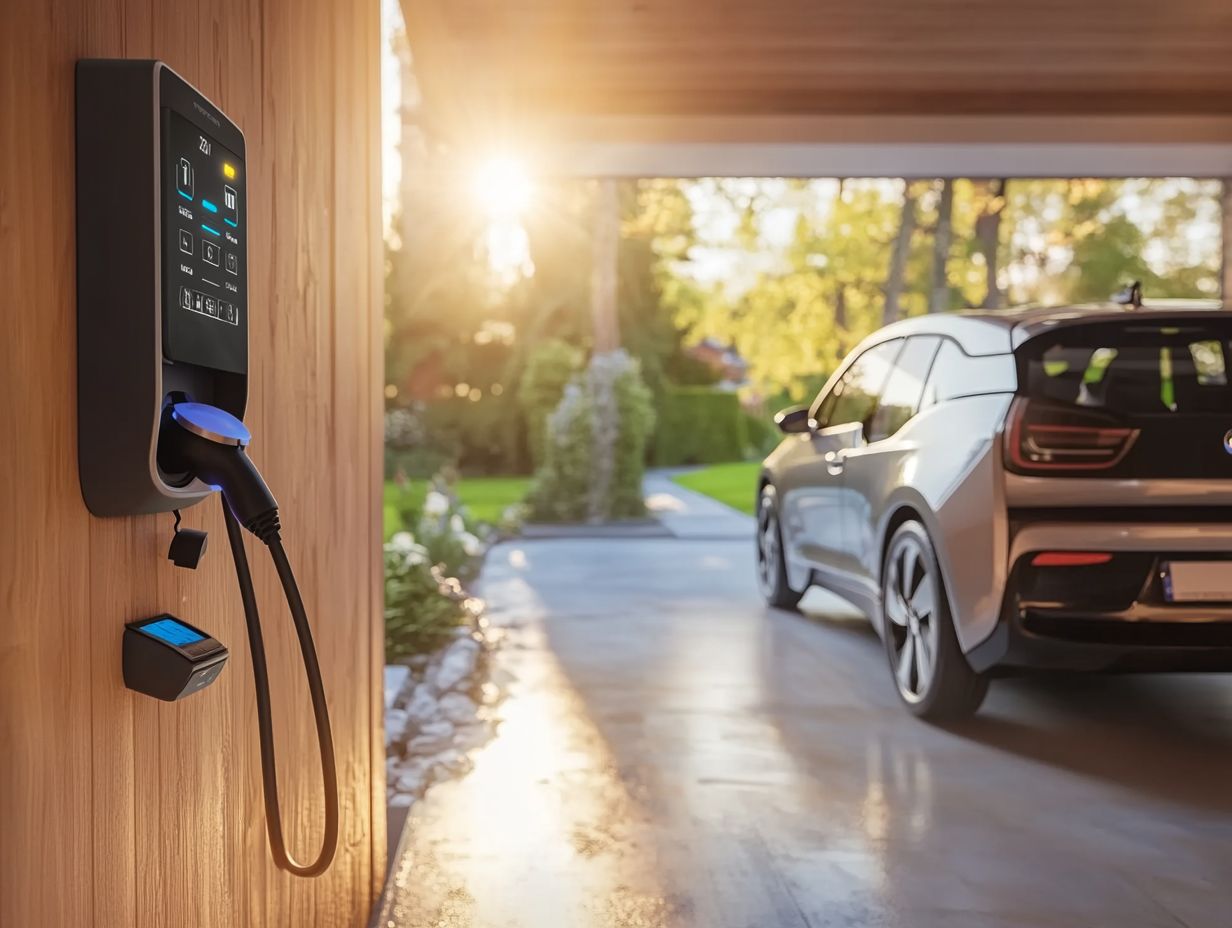
What is meant by ‘home EV charging’?
‘Home EV charging’ refers to the process of charging an electric vehicle (EV) at a personal residence, as opposed to using public charging stations. This typically involves installing a charging unit in a garage or outdoor space for convenient and regular charging at home.
What factors affect the cost of home EV charging?
The cost of home EV charging can vary based on several factors, including the type of EV, the size and efficiency of the battery, the electricity rates in your area, and the charging method used. Level 1 is a standard home outlet, Level 2 is faster and typically requires a special installation, and DC fast charging is the quickest option available at some public stations.
Is it cheaper to charge an EV at home compared to using public charging stations?
In most cases, yes. Charging an EV at home is typically more cost-effective than using public charging stations because you can take advantage of lower electricity rates and avoid additional fees or subscription costs. However, this can vary depending on your location and charging habits.
How can I estimate the cost of home EV charging?
To estimate the cost of charging your EV at home, you can use the following formula: (battery size in kWh) x (electricity rate per kWh) = total cost of charging. Keep in mind that charging rates and electricity prices may fluctuate, so this is just an estimate.
Are there any additional costs associated with home EV charging?
Aside from the cost of electricity, there may be additional costs associated with home EV charging. These can include the initial installation of the charging unit, any necessary electrical upgrades, and potential maintenance or repair costs.
For further resources about EV charging, incentives, or environmental benefits, consider exploring local government websites or EV advocacy groups.
Ready to dive deeper into the world of electric vehicles? Start your journey today!
Is there a way to reduce the cost of home EV charging?
Yes, there are several ways to lower the cost of charging your electric vehicle (EV) at home.
One option is to take advantage of lower electricity rates during off-peak hours, which are times when many people are not using power.
Another great idea is to think about installing solar panels. They allow you to generate your own electricity for charging your EV, which can save you money in the long run.
Regularly maintaining your EV’s battery is also important. It helps you avoid expensive repairs or replacements down the road.

